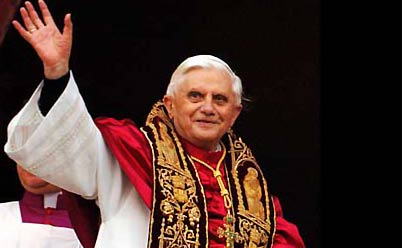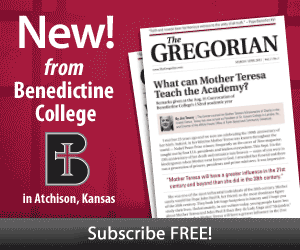Faith
After the Pope: Time to Hit the Books?

It’s going to take a while for all (or any) of us to absorb the significance of Benedict XIV’s first apostolic visit to the United States. Unlike his predecessor, the larger-than-life John Paul the Great, who from the first displayed an actor’s genius for what one observer described as “the symbolic gesture”, Benedict’s public demeanor is that of a mild-mannered intellectual with a professorial penchant for pedantry. He gives speeches before roaring thousands much the way one suspects he used to give lectures before a half dozen drowsy doctoral students. Speaking in English from prepared text, the monotone of his delivery (what the Germans call “sentence melody”, in his case a drone) coupled with the incessant sibilance of his heavy accent, can make for trying listening for English-speaking audiences.
The irony is, when one reads the speeches and documents of the two popes, one is struck by something approaching the opposite effect: The literary output of John Paul II, like the Opus 111 of Beethoven’s late string quartets, is as dense and complex as it is pathbreaking, even revolutionary. One is sorely tempted never to wade into those deep waters of thought without philosophical and theological dictionaries close to hand, and perhaps a bracing shot of whiskey. Reading Benedict, on the other hand, whose prose, even in translation, is as lyrical and elegant as it is clear, concise and powerful, is like listening to an opera by his own beloved Amadeus: the melodies are crystalline, proportioned to a human scale, and delightfully hummable; and one knows one is hearing the voice of God.
With this in mind, I was struck, as I channel-surfed the internet and television for coverage of the pope’s visit, by the persistent strumming of an irritating one-note theme: This visit to America, we were constantly being told, was revealing Benedict’s remarkable transformation from (as one newscaster so cleverly put it, I think on MSNBC) the “Church’s Enforcer to the Pope of Hope.” Reminiscent of one of those anti-war political cartoons from the Vietnam Sixties, an image popped into my head of B16 toting an M16 with a daisy popping out of the end of the gunbarrel. Does this even come close to doing justice to this man and his ministry?
Of course, this game’s been afoot since Benedict’s election, and even before, replete with casual mentions, usually without attendant background information on the Ratzinger family’s anti-Nazi history, of the pope’s having once been “a member of the Hitler Youth”; descriptions of the pope as “the former head of the Vatican office once known as the Inquisition”; “God’s Rotweiller.”
Catholics who followed Ratzinger’s career knew that the Torquemada comparisons were lazy-minded media inventions. Hans Kung was denied the right to teach Catholic theology in a Catholic university, for God’s sake, not thumbscrewed. Still, these good people sometimes played into the hyperbolic stereotypes with their gleeful declarations, on Benedict’s election, that “the cafeteria is now closed!”—this, as if John Paul II had been in the habit of turning a winking eye on dissent. (Remember “liberation theology”? That finger wagging in front of the Sandinista priest’s nose, broadcast to billions worldwide, was Wotjyla’s, not Ratzinger’s.)
True, we all know that assorted media representatives prove on an almost daily basis that they are prepared to discourse with authority on subjects they have studied for a full five minutes. We should therefore not necessarily read anti-Catholic bigotry into their occasionally jaw-dropping ignorance of things Catholic. But maybe it isn’t all the media’s fault, either. Maybe Catholics, as it turns out, haven’t been making many efforts to understand the true nature of Pope Benedict.
This was driven home to me Monday morning when I listened to NPR’s radio summary of the pope’s trip. The piece was entitled, “Pope Tweaks Image on Six-Day trip to U.S.”, and began, “In just six short days, Pope Benedict may have remade his image” --this, as if what had emerged, over the course of the visit, as an obvious shift in perception of who Benedict was and what he stood for, was the result of a calculated Vatican strategy, rather than the simple fact that both the media and many lay faithful were (thanks to the occasion of his pastoral visit) finally taking the trouble to listen to the guy for the length of an entire speech.
The report went on to record sound bites from laity waxing astonished at this “transformation”. Lo and behold, it turns out that Benedict XVI, far from being this era’s Hammer of Heretics (like some Puritan divine of old, terrified lest someone somewhere be caught having fun) is actually a pretty reasonable, amiable and occasionally even inspiring guy!--his accent and droning delivery to the contrary notwithstanding.
But what this reminded me, is that the intellectual laziness too often displayed in the media is hardly peculiar to non-Catholic journalists; no, it is shared to a disconcerting degree by many pew-sitting Catholics—Catholics who obviously do not bother to inform themselves on the doings of the universal church outside Father Joe’s Sunday homily, what they read in their local rag, or what they hear on the nightly news.
No, to paraphrase the Bard, the fault is not in the media but in ourselves that we, even Catholics, absorb these prejudicial one-liners as substantive reportage. Nor is it sufficient (though it helps) to diversify one’s diet by grazing a wider variety of news sources, Catholic and secular, traditional and bloggy. One must instead, I think, go directly to the source, and never more so than in the case of the professorial Benedict XVI. Fact is, those who have bothered, over the course of the last two papacies, to read the published work of Joseph Ratzinger are not in the least surprised by his measured, charitable and candid pastoral approach to difficult, even hot-button issues; it’s always been there, in his words, had any of us bothered to read them.
With a pope like Benedict, whose greatest gift may prove to be a genius for expressing complex and challenging ideas in tempered, humane and even beautiful prose, perhaps it’s time for Catholics to download and printout the texts of Benedict’s speeches, and, better yet, his encyclicals. Maybe it’s time to turn off the computer and the TV, brew a nice hot cuppa, put some Mozart on the stereo, and hit the books—Ratzinger’s books. What we find there might change our lives.
By AT 04.24.08 05:20PM Not Rated
I enjoyed this post. Do you think it is fair to say that the media’s imagined transformation is an implicit assertion that the guarding of orthodoxy is unseemly and oppressive, if not an outright evil?
By AT 04.24.08 06:52PM Not Rated
Beautiful, Debra.
Looks like I’ll have to get to my book pile now…
By AT 04.25.08 01:32AM Not Rated
Thanks, all! Benedict makes for terrific spiritual reading—balm for the soul as well as the mind, no question.
Eric’s question: Hm, the facts would seem to bear that interpretation, although I think ignorance and inbred relativism, as opposed to overt hostility, have to be considered as significant factors.
For many, to affirm (as Benedict continues to do, including in the US visit) that it is not bigotry to proclaim Truth in Charity, is a foreign notion—agree, perhaps sometimes because the Truth is too often proclaimed in heated questions with a profound lack of charity. As Benedict might put it himself, the origins of this problem are “complex”...
I think the key is for us, as American Catholics, to start reading again! And, in terms of evangelization, for emphasizing the need for a true and personal “encounter” with Christ—over and above, and certainly before, we argue details of Catholic moral teaching with our unbelieving friends, family, neighbors, even media representatives.
By AT 04.25.08 02:50PM Not Rated
I’ve assembled a study PDF containing all of the addresses and homilies from the apostolic visit:
http://www.doxaweb.com/blog/2008/04/study-guide-of-pope-benedict-xvis.htm
Now I’d like to expand it with a glossary and some study questions. Any suggestions you have would be welcome!
By AT 04.26.08 06:19AM Not Rated
Time to join Communion and Liberation.
By AT 04.26.08 02:29PM Not Rated
LOL, does one ever exactly “join” CL?
But speaking of CL and Clayton’s efforts to put together a glossary, I was struck by how many times the Pope used what fell on my ears as particularly CL language—the emphasis on the personal encounter with Christ as an “event”, and one which needs to come before everything, and which is at the heart of the new evangelization; the challenge to the Church in the US to come up with creative and imaginative ways to foster that encounter.
It struck me also as the reason why he (apparently to the surprise of many commentators) declined to wag his finger over this or that issue, since the particulars of learning to think with the mind of the Church must needs come *after* the event of personal (and communal) conversion. Did anyone else hear it this way?
By AT 04.26.08 06:03PM Not Rated
Having concelebrated at the Papal Mass in DC, I had the exact experience of Pope Benedict that you aptly described. Granted, upon hearing the message of the Holy Father, my interest was piqued, but I was not exactly filled with evangelical fire upon exiting the National’s stadium.
I knew that, upon returning, I needed to get on line and read his messages, for, having read several of his books and homilies, I am aware that there is much more happening within the text of his homilies than in their delivery.
We have been blessed beyond any doubt with the last two men who have sat in the Chair of Saint Peter. The one-two punch that the writings of these two Popes will have in the future of the world will be a joy to watch unfold. Whether that occurs during our sojourn here on earth, or during the everlasting day of the next life, is up to God.
This much is certain, the Holy Spirit has boldly spoken through both of them, and He is raising up a new army, a mighty army, from the dry bones of this vast desert waste of Western Culture….Veni, Creator Spiritus!









By Harold Fickett AT 04.24.08 01:44PM Not Rated
This accords with my experience exactly, Debra. Benedict’s writings are a treasure and reveal the man as a profound, supple, and poetic thinker. Let me take on more occasion to praise his INTRODUCTION TO CHRISTIANITY. That book alone would transform most Catholics’ understanding of their faith.